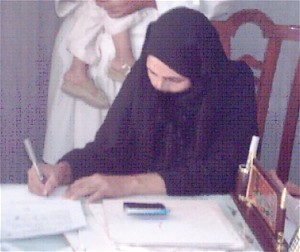
Mrs. Laila of Kandahar Province signs the papers legally freeing her from marriage after her husband’s death eight years before.
USAID/Afghanistan
USAID-funded program legally frees widow from obligations of marriage to a husband deceased for eight years.
The USAID-funded Initiative to Promote Afghan Civil Society focuses on promoting the Universal Declaration of Human Rights and the Islamic, social, political, and cultural rights of women.
15 SEPTEMBER 2010 | KANDAHAR PROVINCE, AFGHANISTAN
In the past 30 years, Afghanistan has seen a number of interrelated and long-running conflicts. Most Afghan families have lost at least one member as a result. In many cases, that person was the only source of income for the family. In fact, according to “Beyond 9/11,” a US-based nonprofit that provides financial support to Afghan widows and children, Afghanistan has one of the highest percentages of widowed females in the world: five percent of the country’s 30 million people.
To promote human and women’s rights in the southwestern provinces of the country, USAID funded the Initiative to Promote Afghan Civil Society (I-PACS) program and launched an awareness-raising project in June 2009. This program focused on promoting among communities in Kandahar, the Universal Declaration of Human Rights to include the Islamic, social, political, and cultural rights of women, and Afghanistan’s national law for the elimination of violence against women. A key component of this project was the referral of cases of women’s rights violations to legal aid organizations.
In October 2009, Mrs. Laila, 30, of Kandahar Province, met with I-PACS staff. She said, “My husband disappeared eight years ago. I know he has died, but I am still obligated to live as his wife. My movements are restricted. I must live with his family and serve them for the rest of my life.” She added, “I need your support to legally release me from this situation.”
I-PACS referred the case to the district-level court and her husband’s family was invited to attend the court sessions. After reviewing all testimony and documents, the judge announced, “Unless the husband’s family is able to provide new information proving this man is still alive, the Court will legally end the marriage of this woman to this man, declaring her a widow.”
No new evidence was presented, and Mrs. Laila was officially released from her marriage in January 2010. She said, “Now I can make whatever decision I wish for my life, and I hope to get a good job and live with no sorrow any longer.”
By creating opportunities for Afghan women to access mechanisms of justice, I-PACS grantees are making real improvements in the quality of women’s lives and helping to heal the wounds inflicted by 30 years of conflict.







Comment
Make a general inquiry or suggest an improvement.